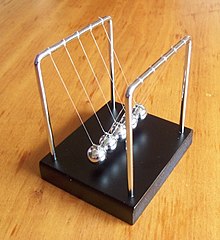An office toy (also known as an executive toy or a desk toy) is a novelty item typically placed on the desk of a corporate executive or other office worker. They have no work-related function, but are often intended to provide decoration or pleasure, relieve stress or inspire creativity.[1][2] The Newton's cradle is a classic example of an office toy.[2][3]

Functions
editDifferent types of office toys fulfill different needs for their users. Although providing pleasure and being decorative could be the two major functions in office toys, there are still some differences between each types of office toys. For example, puzzle-type toys can also help inspire creativity. A fidget spinner is an office toy that is used to reduce stress or boredom.[4] Design curator Donald Albrecht described executive toys as "aspirational" objects, "less tools for provoking creativity than foghorns of identity and status in a sea of corporate homogeneity."[2] Toys with corporate logos act as advertisements, such those distributed by pharmaceutical sales representatives in doctors' offices.[5]
Examples
editReferences
edit- ^ Hsiang Cheng 'Sam' Wang (2007) The Investigation of Office Toy. National Central Library
- ^ a b c d e f Julie Lasky (2015) "Designing Distraction: Executive Toys". The New York Times, 4 February 2015. Retrieved 30 June 2016.
- ^ a b Jason England (2015) "Executive desk toys explained" Cosmos, 20 July 2015. Retrieved 30 June 2016.
- ^ a b James Plafke (2016) Fidget Spinners Are The Must-Have Office Toy For 2017 Forbes, 23 December 2016.
- ^ Pomper, Stephen (May 2000). "Drug Rush". The Washington Monthly. Archived from the original on 4 February 2012. Retrieved 3 December 2011.
- ^ a b Rose Hoare (2012) "Toy story: Office playthings come of age" CNN, 4 September 2012. Retrieved 30 June 2016.
- ^ Chris Merriman (2013) "MIT demonstrates a morphing computer interface". The Inquirer, 14 November 2013. Retrieved 30 June 2016.